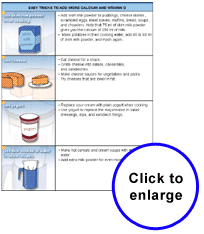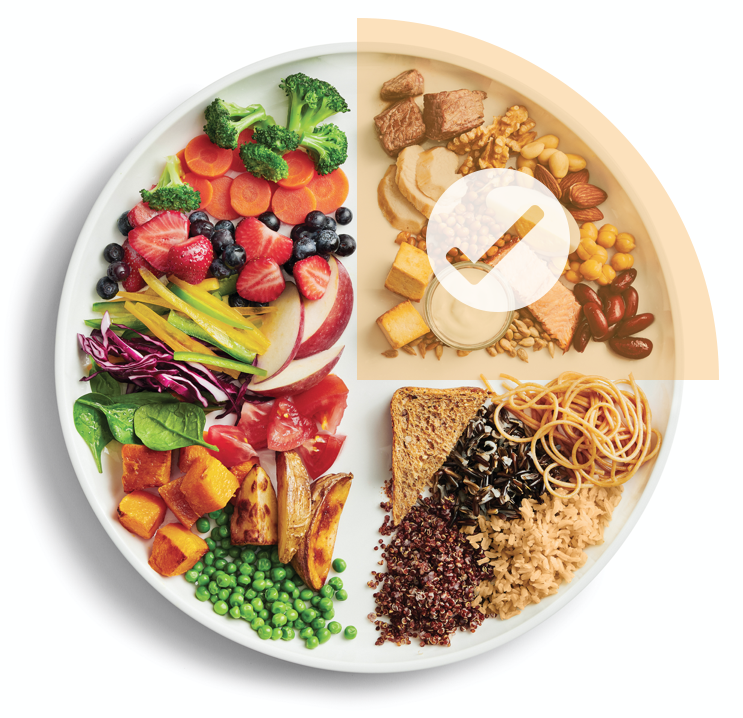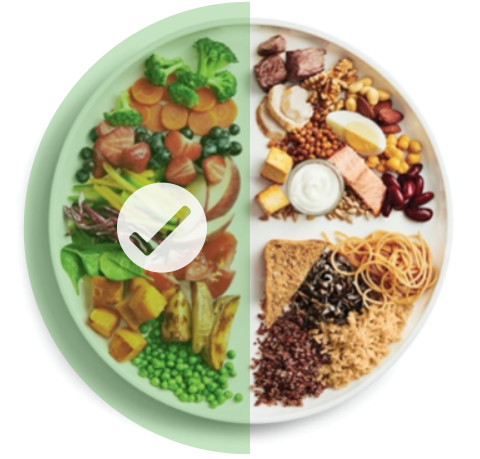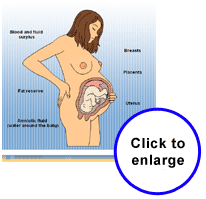MODULE 5
A Healthy Diet
1. Calcium and Vitamin D
Calcium and Vitamin D are essential to help your baby build strong bones and teeth.
The following table contains easy tricks to add more Calcium and Vitamin D to your diet.
Drinking at least two cups of milk every day will help you get more Vitamin D. Other milk products like cheese aren't enriched with Vitamin D, but some yogurts are.

Test Your Knowledge
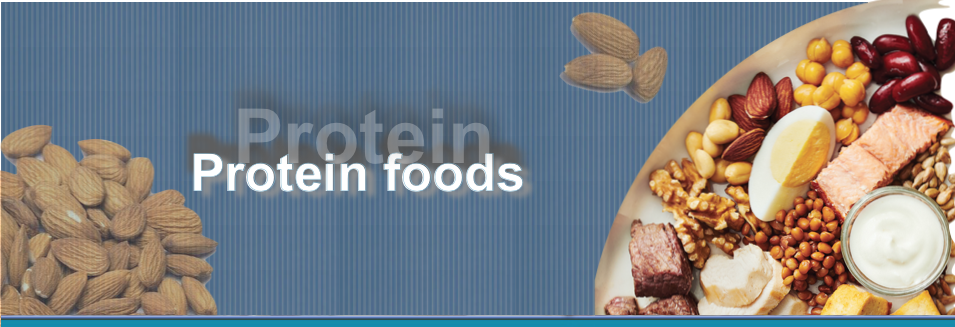 |
||||||
| The following exercise will help you to discover the importance of protein foods. Select and slide each term to its proper place. |
||||||
|
Protein
|
Calcium
|
Iron
|
Vitamin D
|
Fibre
|
Folic acid
|
|
| Nutrient | Functions | |||||
| Builds and repairs all parts of the body and helps to fight infection. | ||||||
| Builds strong bones and teeth. | ||||||
| Your baby stores his or her own reserves which will last for the first four to six months of his or her life. Necessary for your blood to be healthy. | ||||||
| Helps your bowels to function well. Necessary for health in general. | ||||||
| Builds bones and teeth and keeps them strong. It also helps the nervous system to function well and blood to clot. | ||||||
| Helps to produce red blood cells and to build your baby's blood and tissues. | ||||||
3. Protein Foods
Eat protein foods
One quarter of your meal or plate should be protein foods. This can include lower fat unsweetened milk or soy beverage.
Protein foods are an important part of healthy eating. Include foods such as beans, lentils, nuts, seeds, lean meats and poultry, fish, shellfish, eggs, lower fat milk and lower fat dairy products. Some protein foods, like lean meats, are high in iron. Other protein foods, like milk, are high in calcium. Make sure that each meal contains a source of protein.
Among the sources of high quality protein, don't forget eggs, which are economical.
Fish is a protein food that contains the healthy omega-3 fats DHA and EPA. Pregnant or breastfeeding women or women who could become pregnant, should eat fish to get DHA. Some larger fish may contain mercury. If you are pregnant, breastfeeding, or could become pregnant, you should avoid or rarely eat fish that are high in mercury (maximum 150 g or about 2 cups per month). This includes fresh/frozen tuna, shark, swordfish, marlin, orange roughly and escolar. Canned white tuna, or albacore, should be limited to no more than 300 g per week (or 4 cups). You do not need to limit the amount of canned light tuna, which is lower in mercury and usually costs less.
Protein foods include milk, soy beverage, and dairy products. Certain milk products have less fat and energy but still provide high quality protein and calcium. If you do not like milk products or cannot eat them, talk it over with a registered dietitian who can advise you how to get the necessary calcium.
Include proteins that come from plants, such as beans, lentils, nuts and seeds. These protein foods are often less expensive and are high in fibre and low in saturated fat. For ideas to help you eat more proteins that come from plants, visit this Canada’s Food Guide link.
1. Vegetables and Fruits
Have plenty of vegetables and fruits
When putting together a healthy meal, half of your plate should include vegetables and fruits. Include vegetables and fruits at every meal and snack.
Eat a variety of vegetables and fruits. Colourful vegetables and fruits are richer in certain important nutrients. Enjoy salads, broccoli, spinach, squash, sweet potatoes, carrots, cantaloupe, and oranges.
Vegetables and fruits can be eaten fresh, raw, slightly cooked, canned, or frozen.
Choose canned vegetables with little or no sodium added. You can drain and rinse to lower the sodium. Choose canned fruit with little or no added sugar.
Fruit juice is high in sugar. Have a glass of water instead with whole or cut vegetables or fruits.
Make it easy to snack on vegetables and fruits by washing and slicing them ahead of time. Prepare extra vegetables when you’re making a meal, then freeze or refrigerate so it’s easy to add them next time. For other ideas to help you eat more vegetables and fruits, click on this link.
Test Your Knowledge
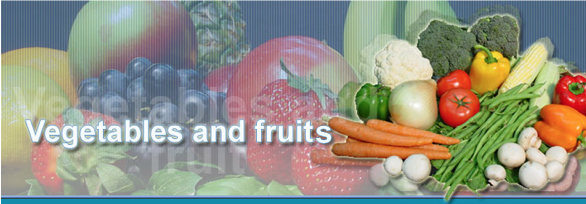 |
||||||
| Why is it important to eat vegetables and fruits. The following exercise will help you to discover their importance. Select and slide each term to its proper place. |
||||||
|
Folic acid
|
Fibre
|
Vitamin A
|
Iron
|
Vitamin C
|
||
| Nutrient | Functions | |||||
| Helps to produce red blood cells and to build your baby's blood and tissues. | ||||||
| Helps build bones and teeth and keeps eyes and skin healthy. | ||||||
| Keeps your gums and blood vessels healthy and helps you fight infections. | ||||||
| Your baby stores his or her own reserves which will last for the first four to six months of his or her life. Necessary for your blood to be healthy. | ||||||
| Helps your bowels to function well. Necessary for health in general. | ||||||
Test Your Knowledge
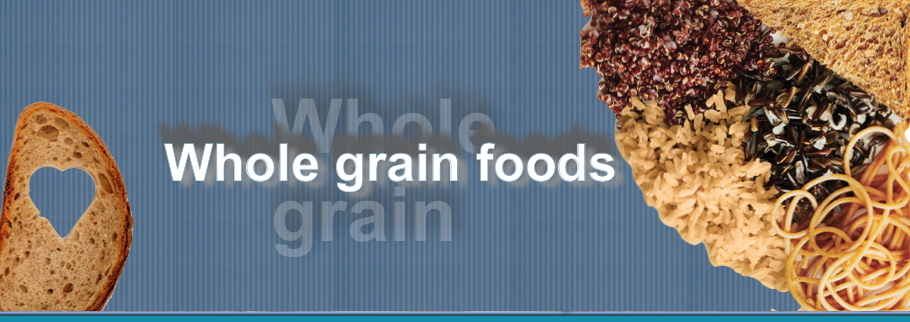 |
||||||
| Why is it important to eat whole grain foods? The following exercise will help you to discover their importance. Select and slide each term to its proper place. |
||||||
|
Vitamin B
|
Fibre
|
Iron
|
Carbohydrates
|
|||
| Nutrient | Functions | |||||
| Gives energy and help transform fat into energy. | ||||||
| Helps your body transform food into energy. Helps keep your eyes, skin, nervous system and appetite healthy. It is also important for growth and development. | ||||||
| Your baby stores his or her own reserves which will last for the first four to six months of his or her life. Necessary for your blood to be healthy. | ||||||
| Helps your bowels to function well. Necessary for health in general. | ||||||
a. Canada's Food Guide
Canada's Food Guide will help you make healthy food choices for you and your baby.

What should I eat?
Canada’s Food Guide includes lots of ideas for ways to eat healthier. By clicking on any of the links below, you will be directed to more information on that topic.
To eat well you should:
How much should I eat?
How much you need to eat depends on how much weight you need to gain, how active you are, and your own personal eating style. Remember to listen to your body. Eat when you are hungry and stop when you are full. Click on this link for ways to be more mindful of your eating habits.
In your second and third trimester, you will need to eat a little more. This can include an extra snack each day. Snacks can include a couple of healthy foods and a healthy drink. Examples of some healthy snacks include an apple and a glass of milk or veggie sticks and hummus. Click on this link for other healthy snack ideas.
Healthy Eating Habits
Besides the foods you choose, other things that can help you eat healthier are:
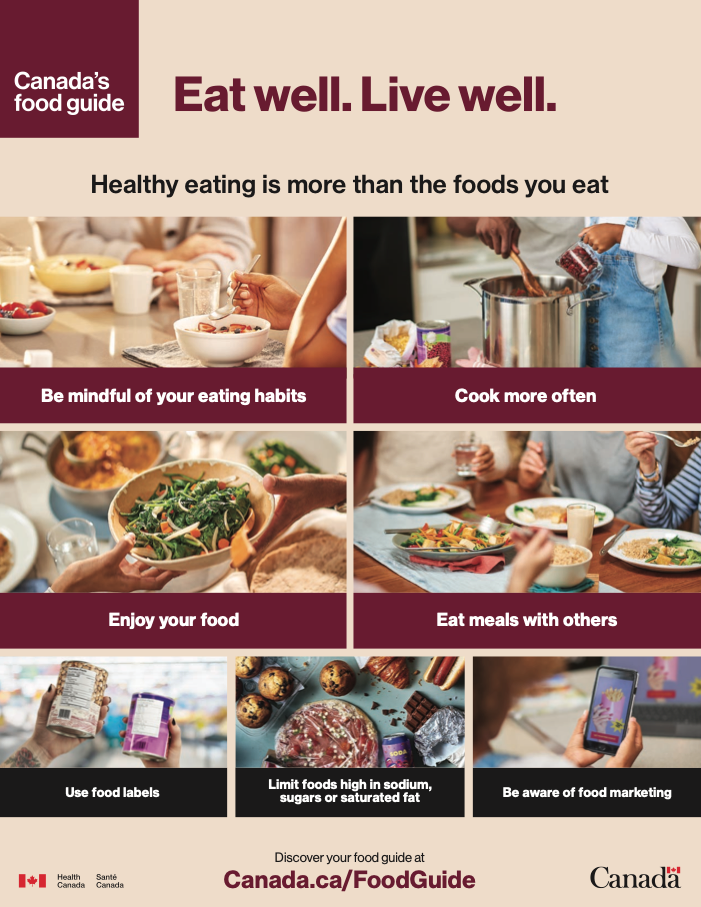
-
Recipes for breakfast, lunch/dinner and snacks.
B. HEALTHY EATING
When you are pregnant, you are nourishing yourself and your baby. It is, therefore, important to learn how to make good food choices.
Variety is the key to healthy eating. Since there is no perfect food, you need to balance the foods you eat. Certain foods must be consumed in moderation so as not to harm your health or the health of your baby.
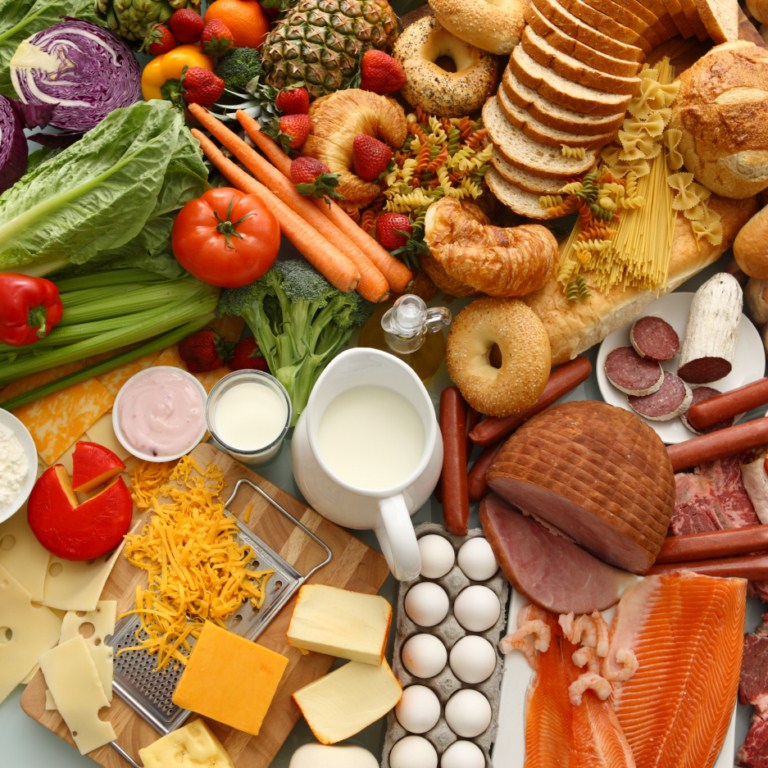
Make a habit of eating regularly. If you find it difficult to eat three meals a day, try eating smaller, lighter meals and snacks more often. The important thing is to plan your meals so that you will eat foods necessary for both you and your baby. Try to choose from at least three different Food Groups when preparing a meal, and from two Food Groups for a snack.
Pregnant women should eat breakfast as soon as they get up in the morning. Since you have not eaten from the time you went to bed the night before, you need to eat healthy food in order to get the energy necessary to get going again.
c. Gaining Weight Gradually
When you gain weight during pregnancy is just as important as how much weight you gain.
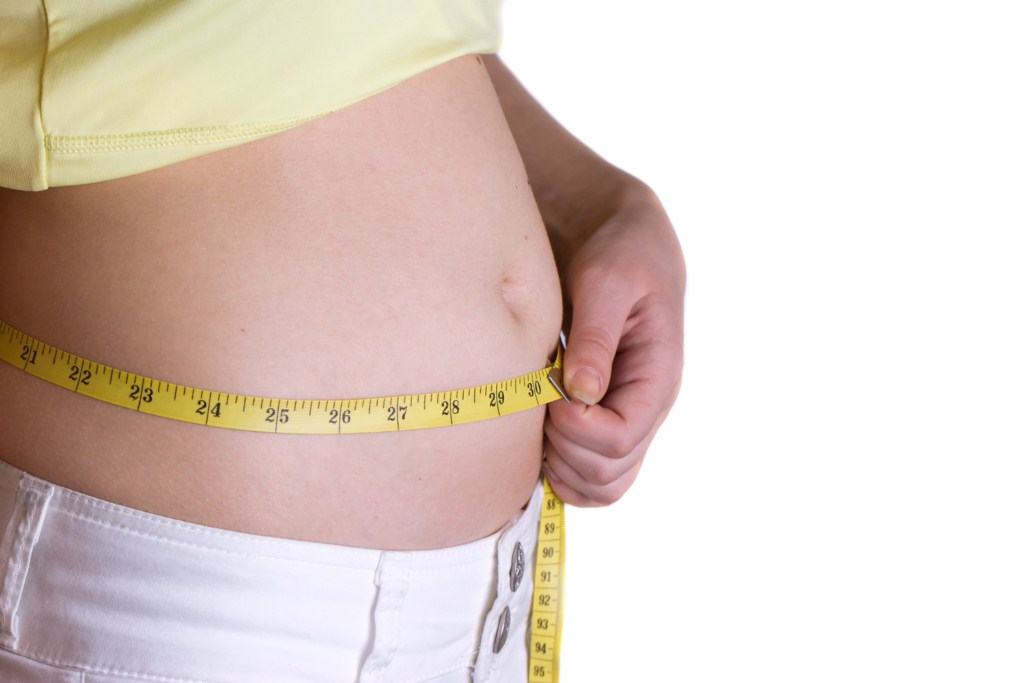
Most women do not gain much weight during the first three months of pregnancy. A total of 0.5 to 2 kg or 1 to 5 pounds is normal. Although still very small, the baby is developing very rapidly. Healthy eating is important throughout your pregnancy.
For the rest of your pregnancy, the baby continues to grow bigger and stronger. You should expect to gain about 0.5 kg or 1 pound per week.
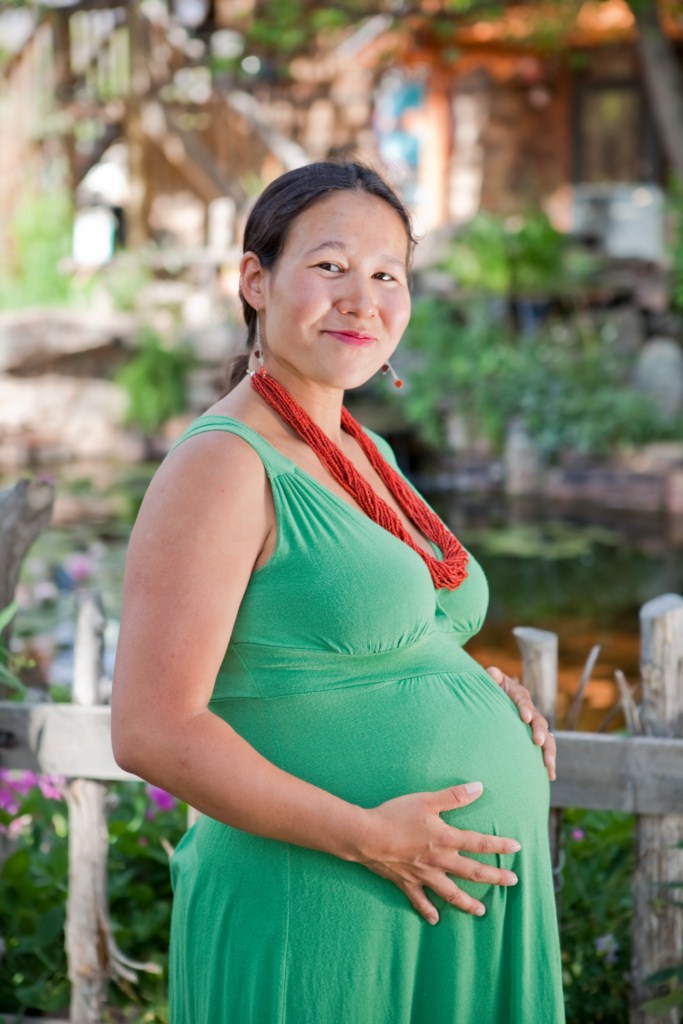
Gradual weight gain is a sign of a normal and healthy pregnancy. If you gain much more or much less than 0.5 kg or 1 pound a week in your second and third trimesters, talk it over with your health care provider.


